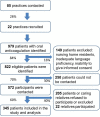Safety relevant knowledge of orally anticoagulated patients without self-monitoring: a baseline survey in primary care
- PMID: 24885192
- PMCID: PMC4045910
- DOI: 10.1186/1471-2296-15-104
Safety relevant knowledge of orally anticoagulated patients without self-monitoring: a baseline survey in primary care
Abstract
Background: Effective and safe management of oral anticoagulant treatment (OAT) requires a high level of patient knowledge and adherence. The aim of this study was to assess patient knowledge about OAT and factors associated with patient knowledge.
Methods: This is a baseline survey of a cluster-randomized controlled trial in 22 general practices with an educational intervention for patients or their caregivers. We assessed knowledge about general information on OAT and key facts regarding nutrition, drug-interactions and other safety precautions of 345 patients at baseline.
Results: Participants rated their knowledge about OAT as excellent to good (56%), moderate (36%) or poor (8%). However, there was a discrepancy between self-rated knowledge and evaluated actual knowledge and we observed serious knowledge gaps. Half of the participants (49%) were unaware of dietary recommendations. The majority (80%) did not know which non-prescription analgesic is the safest and 73% indicated they would not inform pharmacists about OAT. Many participants (35-75%) would not recognize important emergency situations. After adjustment in a multivariate analysis, older age and less than 10 years education remained significantly associated with lower overall score, but not with self-rated knowledge.
Conclusions: Patients have relevant knowledge gaps, potentially affecting safe and effective OAT. There is a need to assess patient knowledge and for structured education programs.
Trial registration: Deutsches Register Klinischer Studien (German Clinical Trials Register): DRKS00000586.Universal Trial Number (UTN U1111-1118-3464).
Figures
Similar articles
-
Practice nursed-based, individual and video-assisted patient education in oral anticoagulation--protocol of a cluster-randomized controlled trial.BMC Fam Pract. 2011 Apr 10;12:17. doi: 10.1186/1471-2296-12-17. BMC Fam Pract. 2011. PMID: 21477372 Free PMC article. Clinical Trial.
-
Patients' knowledge on oral anticoagulant treatment in Hungary.Int J Clin Pharm. 2017 Dec;39(6):1265-1272. doi: 10.1007/s11096-017-0544-1. Epub 2017 Oct 19. Int J Clin Pharm. 2017. PMID: 29052116
-
Supporting patients to self-monitor their oral anticoagulation therapy: recommendations based on a qualitative study of patients' experiences.Br J Gen Pract. 2015 Jul;65(636):e438-46. doi: 10.3399/bjgp15X685645. Epub 2015 Jun 15. Br J Gen Pract. 2015. PMID: 26077266 Free PMC article.
-
Differences in attitude, education, and knowledge about oral anticoagulation therapy among patients with atrial fibrillation in Europe: result of a self-assessment patient survey conducted by the European Heart Rhythm Association.Europace. 2016 Mar;18(3):463-7. doi: 10.1093/europace/euv448. Epub 2016 Feb 21. Europace. 2016. PMID: 26899998 Review.
-
Effectiveness of avatar-based technology in patient education for improving chronic disease knowledge and self-care behavior: a systematic review.JBI Database System Rev Implement Rep. 2019 Jun;17(6):1101-1129. doi: 10.11124/JBISRIR-2017-003905. JBI Database System Rev Implement Rep. 2019. PMID: 31021975
Cited by
-
Predictors of warfarin non-adherence in younger adults after valve replacement surgery in the South Pacific.Heart Asia. 2016 Jun 14;8(2):18-23. doi: 10.1136/heartasia-2016-010751. eCollection 2016. Heart Asia. 2016. PMID: 27347009 Free PMC article.
-
Patient Knowledge about Oral Anticoagulation Therapy Assessed during an Intermediate Medication Review in Swiss Community Pharmacies.Pharmacy (Basel). 2020 Mar 28;8(2):54. doi: 10.3390/pharmacy8020054. Pharmacy (Basel). 2020. PMID: 32231095 Free PMC article.
-
Does a complex intervention increase patient knowledge about oral anticoagulation? - a cluster-randomised controlled trial.BMC Fam Pract. 2017 Feb 7;18(1):15. doi: 10.1186/s12875-017-0588-2. BMC Fam Pract. 2017. PMID: 28166725 Free PMC article. Clinical Trial.
-
Disease understanding in patients newly diagnosed with atrial fibrillation.Heart. 2018 Mar;104(6):494-501. doi: 10.1136/heartjnl-2017-311800. Epub 2017 Aug 8. Heart. 2018. PMID: 28790169 Free PMC article.
-
Unlocking Urban India's Awareness of Oral Anticoagulation: Implications for Healthcare Education.Turk J Pharm Sci. 2025 Mar 7;22(1):19-25. doi: 10.4274/tjps.galenos.2024.80069. Turk J Pharm Sci. 2025. PMID: 40052339 Free PMC article.
References
-
- Camm AJ, Lip GY, De Caterina R, Savelieva I, Atar D, Hohnloser SH, Hindricks G, Kirchhof P, Bax JJ, Baumgartner H, Ceconi C, Dean V, Deaton C, Fagard R, Funck-Brentano C, Hasdai D, Hoes A, Kirchhof P, Knuuti J, Kolh P, McDonagh T, Moulin C, Popescu BA, Reiner Z, Sechtem U, Sirnes PA, Tendera M, Torbicki A, Vahanian A. ESC Committee for Practice Guidelines (CPG) et al.2012 focused update of the ESC Guidelines for the management of atrial fibrillation: an update of the 2010 ESC Guidelines for the management of atrial fibrillation. Developed with the special contribution of the European Heart Rhythm Association. Eur Heart J. 2012;33:2719–2747. - PubMed
-
- Rydén LE, Curtis AB, Ellenbogen KA, Halperin JL, Le Heuzey JY, Kay GN, Lowe JE, Olsson SB, Prystowsky EN, Smith SC Jr, Jacobs AK, Adams CD, Anderson JL, Antman EM, Nishimura R, Ornato JP, Page RL, Riegel B, Priori SG, Blanc JJ, Budaj A, Camm AJ, Dean V, Deckers JW, Dickstein K, McGregor K, Metra M, Morais J. European Heart Rhythm Association et al.ACC/AHA/ESC 2006 guidelines for the management of patients with atrial fibrillation - executive summary: a report of the American College of Cardiology/American Heart Association Task Force on Practice Guidelines and the European Society of Cardiology Committee for Practice Guidelines (Writing Committee to Revise the 2001 Guidelines for the Management of Patients With Atrial Fibrillation) J Am Coll Cardiol. 2006;48:854–906. doi: 10.1016/j.jacc.2006.07.009. - DOI - PubMed
-
- Saal K, Hoffmann B, Blauth E, Rohe J, Beyer M, Harder S, Gerlach FM. Analyse des Behandlungsprozesses bei der oralen Antikoagulationstherapie zur Identifikation von Sicherheitsproblemen in der hausärztlichen Versorgung. [Analysis of the process of oral anti-coagulation therapy for the identification of safety problems in primary care] Z Allg Med. 2009;85:148–155.
Publication types
MeSH terms
Substances
Associated data
LinkOut - more resources
Full Text Sources
Other Literature Sources
Medical



